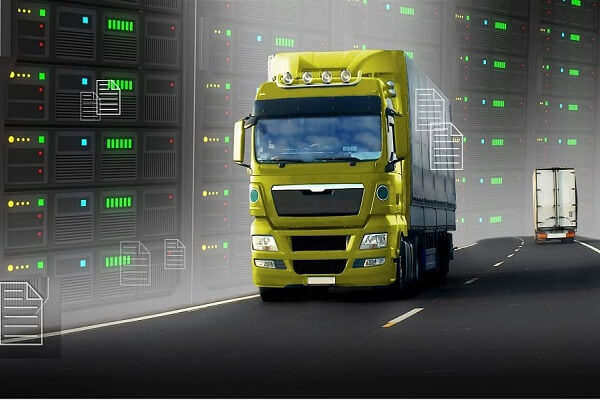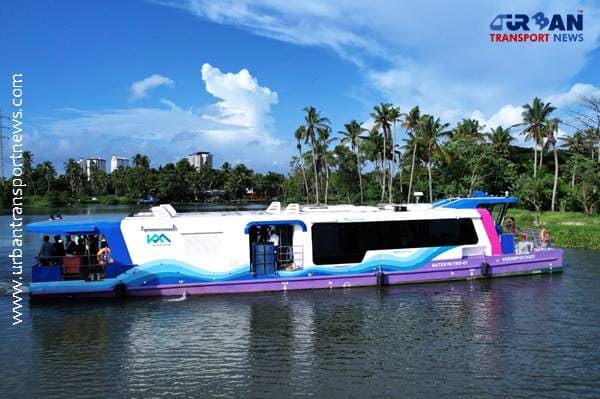 North-South Commuter Railway (NSCR): Modern Train Network Connecting Luzon Island
North-South Commuter Railway (NSCR): Modern Train Network Connecting Luzon Island India launched Bharat Taxi Service as First Cooperative-Owned Digital Mobility Platform
India launched Bharat Taxi Service as First Cooperative-Owned Digital Mobility Platform India places World’s First Live Commercial Order for Hyperloop-Based Cargo Logistics
India places World’s First Live Commercial Order for Hyperloop-Based Cargo Logistics How Weigh-in-Motion Systems Are Revolutionizing Freight Safety
How Weigh-in-Motion Systems Are Revolutionizing Freight Safety Women Powering India’s Electric Mobility Revolution
Women Powering India’s Electric Mobility Revolution Rail Chamber Launched to Strengthen India’s Global Railway Leadership
Rail Chamber Launched to Strengthen India’s Global Railway Leadership Wage and Hour Enforcement Under the Massachusetts Wage Act and Connecticut Labor Standards
Wage and Hour Enforcement Under the Massachusetts Wage Act and Connecticut Labor Standards MRT‑7: Manila’s Northern Metro Lifeline on the Horizon
MRT‑7: Manila’s Northern Metro Lifeline on the Horizon Delhi unveils ambitious Urban Mobility Vision: Luxury Metro Coaches, New Tunnels and Pod Taxi
Delhi unveils ambitious Urban Mobility Vision: Luxury Metro Coaches, New Tunnels and Pod Taxi Qatar approves Saudi Rail Link Agreement, Accelerating Gulf Railway Vision 2030
Qatar approves Saudi Rail Link Agreement, Accelerating Gulf Railway Vision 2030
Digital Transformation of Transportation and Logistics

Digital technology has changed several aspects of our lives in various industries like healthcare and education. Transportation and logistics also saw shifts from digitization as more people had access to computers for everyday work. From online grocery stores, local delivery apps, or even on-demand airport shuttle services, technologies have given better options for customers and opportunities to businesses at a lower cost than before.
Apart from these traditional business benefits that organizations can get by adopting digital solutions, there are other critical areas where digital has been instrumental in supporting transportation and logistics. For example, digitization has helped bring a lot of transparency in the transportation sector, which had been lacking on many levels because of non-digital methods used for operation.
The Future of Transportation is Digital
Digitalization has helped in integrating the various stakeholders involved in transportation. It has also increased the efficiency and lowered the cost while keeping customer satisfaction high. However, despite several positive impacts of digitalization, a few areas still need digital transformation to take place for better results.
Sustainable Mobility
With more and more people switching to electric vehicles, digitization has also played an important role in making this transition possible. The future of sustainable mobility will be heavily digitized, and it will help improve the industry further. With data at their fingertips, enterprises can make decisions based on real-time facts, which have been difficult to measure with traditional methods, especially logistics.
Digital trends in transportation and logistics include AI, IoT, autonomous cars, smart connected vehicles, location services, cloud-based systems, blockchain in logistics, and self-driving drones.
AI in Transportation and Logistics
Digitization started to transform the transportation and logistics industry in the late 1990s. Many small businesses were born, which improved customer service and the way people got their orders. Yet, digitization has been continuous, and there have been many changes in technology that have helped make it a wider concept today. The emergence of AI has revolutionized business practices by analyzing data with greater precision than humans can do. AI-based systems like machine learning or deep learning are crucial for secure transactions such as banking, where fraud detection is crucial.
IoT in Transportation and Logistics
Internet of Things also plays a major role in the transportation and logistics industry. It helps businesses use real-time data (or near real-time) to improve processes, reduce costs, increase efficiency, and provide better services. IoT is also helpful when it comes to managing networks where many devices need to be managed efficiently. As a result, many large organizations have successfully integrated IoT into their business operations and are constantly looking for more ways to use the technology effectively.
Autonomous Vehicles
The transportation industry has been looking forward to self-driving vehicles for some time now. There is a lot of research done by many companies around the world to make this technology more robust and ready for even complex traffic situations. Autonomous cars function on AI which makes them truly smart and reliable and eco-friendly because it uses electric energy, unlike traditional combustion engines.
The technology has already started to be used in public transportation such as buses and train stations, where driverless vehicles can perform more perfectly than human drivers. In addition, many large logistics companies have started to explore how they can utilize autonomous cars to reduce costs and increase efficiency.
Cloud-Based Systems
Cloud systems are used by most enterprises today as they offer more agility, scalability, and lower costs for businesses than traditional servers. For example, in transportation and logistics, cloud storage has been vital for using digital technologies like IoT more effectively and efficiently since much data is being collected from many devices. By using cloud storage, it's easier to manage all kinds of data, including structured or unstructured ones, which will be crucial for smart city projects. In addition, cloud storage solutions allow enterprises to improve their service delivery by integrating other connected devices such as customer devices, distribution centers, etc.
Smart Connected Vehicles
There will be extensive use of connected vehicles in the future, bringing about a greater level of efficiency in operations. In addition, the data collected from various connected devices can be made accessible through virtual mobility services and help enterprises optimize their business strategies depending on market demand, fuel prices, or even accidents along the route.
Connected vehicles will also be helpful in logistics because they can communicate with other autonomous cars, trucks, or even drones and transmit data to the destination.
Location-based Services
Geolocation has become the biggest need of businesses as they can use data to improve their services and increase productivity. Businesses have been collecting location data for years, but its application was not widespread due to a lack of tools for gathering, sharing, analyzing, and understanding this information. In the future, a location-based analysis will be a common practice in many areas, such as marketing campaigns or financial transactions where location is an important factor.
Businesses will be able to use customer's locations on the map to help them understand how and when they can get their orders.
Cloud-Based Systems
Cloud computing has already affected the transportation industry by integrating better technologies into business operations. With cloud-based systems, companies have more ways to store sensitive information while having full access to it from anywhere in the world. Transportation companies are choosing to implement cloud-based solutions in most cases because it allows them to focus on their core business functions, such as providing services. At the same time, an IT department takes care of hardware, software, and security concerns.
Transportation companies can also use Cloud-based systems to share data with other organizations through APIs, which results in greater efficiency. With the help of IoT and cloud-based technologies, many businesses in the transportation and logistics industry have reduced costs, increased efficiency, and provided better services to their customers.
Blockchain in Logistics
Blockchain is a technology that is being applied to different industries all over the world. It has already established its place as a payment method and has gained popularity due to its decentralized nature and high-security features. Some companies are currently implementing blockchain in some parts of their operations, while others have successfully tested the new technology. As a result, blockchain will change the way the logistics industry works.
Blockchain technology can be used for many logistics-related applications such as supply chain management, shipping, and tracking of goods or even air freight shipment. It will also generate a great amount of data used in logistics research to predict market trends or factors that influence demand based on location, weather patterns, and other variables. Secure voting systems using blockchain is another opportunity that companies should explore whenever they need to use this feature in their operations.
Self Driving Drones
Drones have become an integral part of many industries. Their small size and ability to fly at high altitudes make them perfect for delivering goods to remote areas or providing enhanced aerial views during inspections. In the future, self-driving drones will be widely used in developing countries where traffic congestion is common.
Companies can use self-driving drones not just for deliveries but also for inspections along complex routes that are hard to reach by land vehicles but easier by air. For example, these special drones will make it possible to check bridges, towers, and power lines from up above and without risking human lives.
Conclusion
The transportation and logistics industry has been affected by digital transformation. Businesses are using data to improve their operations, increase productivity, make better business decisions or be more efficient in sharing information with other organizations through APIs and route planning optimization. In some cases, the use of blockchain technology is being applied to expedite transactions and provide greater security for sensitive materials such as goods that need to stay frozen during transport while preventing theft.
Self-driving drones will also play a role in future deliveries because they can fly over traffic jams at high altitudes without risking human lives when inspecting structures from an aerial view. The possibilities for how this emerging tech can affect our day-to-day work seem endless!






